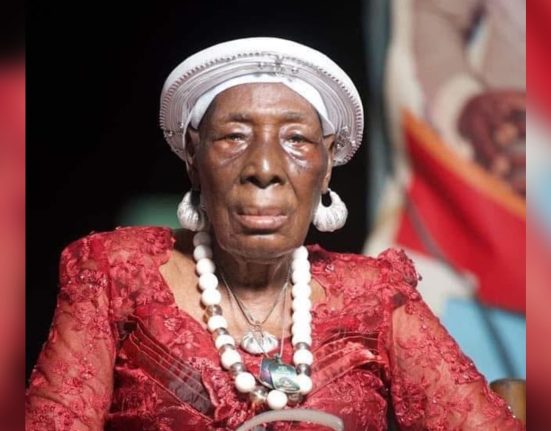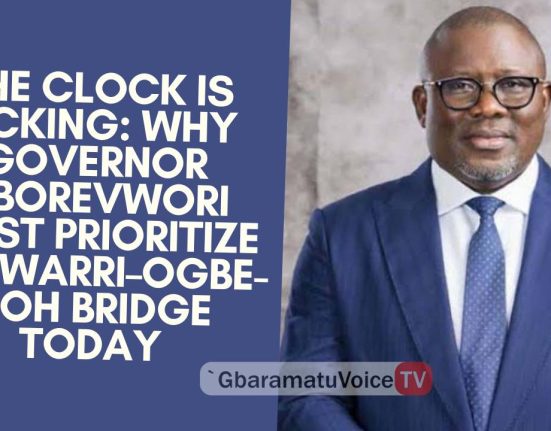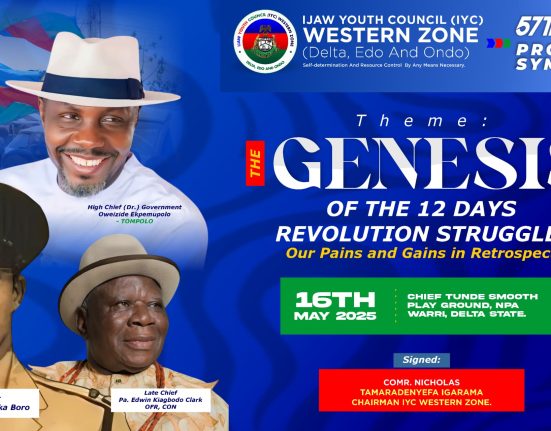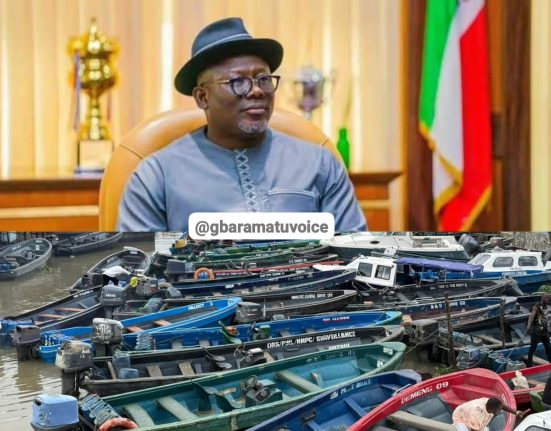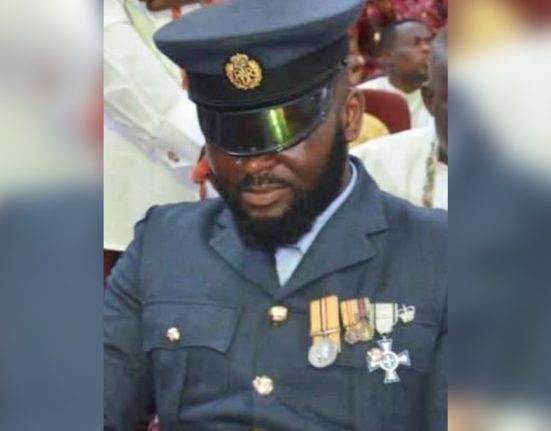
•How Williams Ogoba Emerged As The New Pere
•Pere’s (Kings) In Gbaramatu From 1372 Till Date
The long yearnings for a Kingship by the Gbaramatu Ijaws, in Warri South West Local Government Area of Delta State, was put to rest last month, as people from various communities and beyond trooped out en mass to witness the selection of a new Pere (King) of the Kingdom.
Dwellers of various communities under the Kingdom and beyond, spurned the menace looking military men (positioned at strategic locations of the Kingdom by the Federal Government to checkmate the illegal activities of sea piracy, illegal bunkering and attacks on crude oil pipelines) gathered in excitement at Oporoza, the headquarters of the Kingdom, to witness the selection.
It is worth noting that since the demise of His Royal Majesty, Pere Godwin K. Bebenimibo, DSP (RTD), Ogeh Gbaran III in the year 2013, Gbaramatu Kingdom has been under the rulership of a regent.
Meanwhile, according to the traditions and customs of Gbaramatu Kingdom, after the demise of the Pere (King), three contestants from a ruling house in a community, that is, the next community entitled for the kingship, usually vie for the stool of the traditional ruler of the kingdom.
Consequently, these three contestants names are thereafter forwarded to a committee refer to as Pere Sele-Ogbo, meaning ‘King Selection Committee’, that is saddled with the responsibility of selecting the next king at the headquarters (Oporoza) for further screening and deliberations, after which a candidate is selected as successor to the throne and consequently presented to the King Makers for crowning.

HOW WILLIAMS OGOBA EMERGED AS THE NEW PERE
The story of the new Pere (King) is not different as the Pere Sele-Ogbo (King Selection Committee) led by Chief Nelson Ogelegbawei, the Tonwei of Gbaramatu Kingdom, with a view to selecting a new King, screened and deliberated on the three names forwarded to it by the Oboro ruling house in Benikrukru Community.
Though there were apparent apprehensions and speculations on who was going to ascend the throne, resulting to a long awaited outcome of a close-door meeting amongst Community Chiefs and concerned Committees at Oporoza guest house, Gbaramatu Voice can authoritatively report that the concerned Chiefs at the meeting refused to brief anyone on the outcome of the long-hour meeting, but rather moved from there straight to the palace for the next session.
Exercising powers vested on it, the Pere Sele-Ogbo however put all apprehensions and speculations to rest at the Palace, as the Secretary of the Committee, Chief Godspower Gbenekama presented a chosen candidate, Prince Williams N. S. Ogoba to the Chairman, Pere Tua-Ogbo (King Maker Committee), Chief Alfred Bubor and the Regent of Gbaramatu Kingdom, Elder Chief P. T. Heavens for confirmation.
Announcement of William N. S. Ogoba as The 26th Pere of Gbaramatu Kingdom was greeted with loud cheers and applauds by the patiently waiting crowd, as he stood up for identification with his observable well-built frame, handsome look and calm appearance.

The Chairman of the Pere Tua-Ogbo, according to tradition and custom, thereafter confirmed William N. S. Ogoba as the Pere and conferred him the rights to occupy the stool as the 26th Pere of Gbaramatu Kingdom.
Confirmation by the Chairman of the Pere Tua-Ogbo committee was affirmed by the Regent of Gbaramatu Kingdom, Chief (Elder) P. T. Heavens, who had occupied the position for twenty-six months. He acknowledged the completion of the procedures that brought the Pere and confirmed it to be in line with the tradition.
The regent, in his submission wished the cooperation he received from the Gbaramatu traditional council to be given to the Pere, while he urged all and sundry in the Kingdom to live in peace and harmony. He further warned them not to be used as an instrument in dividing the people of the Kingdom.
While appreciating the Pere Sele-Ogbo for their commitments, Elder Chief P. T. Heavens prayed for peace and prosperity in the Kingdom, as he urged other contestants who lost out in the process to be of good cheer and faith. He further stressed the need for the contestants to cooperate with the Pere in building Gbaramatu Kingdom to an enviable height.
After this session, guests present at the occasion proceeded to Oporoza guest house for entertainment, and for further meetings amongst the Chiefs and the Pere in a closed chamber.
PERE’S (KINGS) IN GBARAMATU FROM 1372 TILL DATE
Meanwhile, before the advent of British colonial rule in Nigeria, Gbaraun-Amatu Kingdom, as it was called then, just like other clans or empires, was being ruled and administered by the head of the existing traditional institutions then, and they were known as “Pere” (King). His Royal Majesty, Pere Gbarawei Izo, Gbaraun I, was the first Pere of the Kingdom and he reigned for forty-nine (49) years (1372-1421). After Pere Izo joined his ancestors, His Royal Majesty, Pere Oporoza Gbarawei, Oporozawei I, ascended the throne in the year 1421 and exited 1426, reigning for just five (5) years. Pere Gbarawei exit in the year 1426 paved way for his His Royal Majesty, Pere Fiebai Oporoza, Oporozawei II, who reigned for another forty-two (42) years. His departure in the year 1468 created a vacuum for a kingship in the Kingdom, and this brought in His Royal Majesty, Pere Egelou Ogei, Ogei I, in the year 1468. Pere Egelou joined his ancestors in the year 1495 after reigning for twenty-seven (27) years. After this, His Royal Majesty, Pere Sei Ikirentimi, Ikirentimi I, was selected in the year 1495. Pere Sei Ikirentimi exited in the year 1560 after reigning for sixty-five (65) years. His Royal Majesty, Pere Burun Oboro, Oboro I, took over from Pere Sei Ikirentimi in the year 1560 and exited in the year 1590 after reigning for thirty (30) years. This was followed by His Royal Majesty, Pere Ebiabo Ofomini, Ebiabo I, who ascended the throne in the year 1590. He joined his ancestors in the year 1627 after reigning for thirty-seven (37) years. Thereafter, it was His Royal Majesty, Pere Ebiowei Arugu, Arugu I, in the year 1627. He passed away in the year 1652 after reigning for twenty-five (25) years. His Royal Majesty, Pere Veke Daugeregha, then came in as the Daugeregha I, in the year 1652. He too joined his ancestors in the year 1670 after reigning for eighteen (18) years. Thereafter, His Royal Majesty, Pere Agidiwei Dein-Owei, Dein-Owei I, ascended the throne in the year 1670 and exited in the year 1689 after reigning for nineteen (19) years. It was then the turn of His Royal Majesty, Pere Ebime Ugborugbo, Ugborigbo I, in the year 1689. He left to the great beyond in the year 1711 after reigning for twenty-two (22) years. His Royal Majesty, Pere Ekiri Saisai, Saisai I, thereafter came on board in the year 1711 and exited in the year 1728 after reigning for seventeen (17) years. Pere Saisai demise brought in His Royal Majesty, Pere Ebilade Tomitibi, Tomitibi I, in the 1728. He joined his ancestors in the year 1739 after reigning for eleven (11) years. His Royal Majesty, Pere Amakubu Ogbeyama, Ogbeyama I, became the next Pere in the year 1739. He passed away in the year 1760 after reigning for twenty-one (21) years. His Royal Majesty, Pere Suaru Usaku thereafter became the Usaku I, in the year 1760 and joined his ancestors in the year 1761 after reigning for just a single year. The untimely demise of Pere Usaku paved way for His Royal Majesty, Pere Bojo Usaku as the Usaku II, in the year 1761. He too joined his ancestors in the year 1800 after reigning for thirty-nine (39) years. His Royal Majesty, Pere Brabai Fieowei, Fieowei I, thereafter came on board in the year 1800 and exited in the year 1825 after reigning for twenty-five (25) years. His Royal Majesty, Pere Ikiyan Etibo, Etibo I, took over from Pere Fieowei in the year 1825 and exited in the year 1848. His reign lasted for twenty-three (23) years. Thereafter, His Royal Majesty, Pere Ofini-Egbe Kenebra, Kenebra I, ascended the throne in the year 1848 and departed to the great beyond in the year 1861 after reigning for thirteen (13) years. His Royal Majesty, Pere Ofomini Agbo, Agbo I, became the next Pere in the year 1861. He joined his ancestors in the year 1872 after reigning for eleven (11) years. His Royal Majesty, Pere Egbene Gbazo, Gbazo I, became the next Pere in the year 1872 and exited in the year 1892 after reigning for twenty (20) years. It was thereafter the turn of His Royal Majesty, Pere Furuh Ekpesin, Ekpesin I, who reigned between 1892 and 1913. His reign lasted for twenty-one (21) years. The demise of Pere Ekpesin brought in His Royal Majesty, Pere Tanga Ukpolukpo, Ukpolukpo I, in the year 1913. He too departed to join his ancestors in the year 1924 after reigning for eleven (11) years.
Immediately after the demise of Pere Ukpolukpo in the year 1924, there was a period of interregnum for about fifty-two (52) years. This is the period the British came to Nigeria and introduced colonial rule. During this period, Warrant Chiefs were appointed by the colonial masters to rule over Gbaramatu Kingdom. After the nation’s independence in the year 1960, Gbaramatu was able to choose Pere for herself and His Royal Majesty, Pere Zai Tiemo was selected as the Gbaraun II in the year 1976. He joined his ancestors in the year 2000 after reigning for twenty-four (24) years.
In the year 2000, there was another brief interregnum. This was done with the aim of following due process in the selection of a new King (Pere). During this brief period of interregnum, the Kingdom was ruled through a regent, Chief Alfred Bubor. He ruled from 2000 to 2004. Chief Wolo Ukulor also ruled as regent for another four years, that is, from 2004 2008. However, in the year 2008, Pere Godwin K. Bebenimibo, (DSP, RTD) was installed, crowned and enthroned as Ogeh Gbaraun III, Aketekpe (Agadagba) of Gbaramatu Kingdom. He departed to the great beyond in the year 2013 after reigning for five (5) years.
When Ogeh Gbaraun III, Aketekpe (Agadagba) of Gbaramatu kingdom exited the throne in the year 2013, there was another brief interregnum from 2013 till date in order to give room for due process in the selection of a new king (Pere). During this period, Chief (Elder) Oyagha Heavens was selected to rule the Kingdom as regent pending the enthronement of a new king. The vacant stool since 2013 paved for another Pere, and Prince Williams Naira Ogoba, from Benikrukru community ruling house was selected on the 25th of February 2016, as the 26th Pere of Gbaramatu Kingdom.


